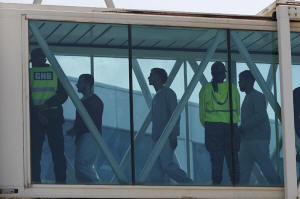Trump touts Supreme Court deportation ruling as a major victory, but
legal fight is far from over
[April 09, 2025]
By LINDSAY WHITEHURST and ALANNA DURKIN RICHER
WASHINGTON (AP) — The Trump administration is touting a Supreme Court
ruling allowing it to resume deportations under the Alien Enemies Act as
a major victory, but the immigration fight is far from over.
The divided court found that President Donald Trump can use the 18th
century wartime law to deport Venezuelan migrants accused of being gang
members to a notorious prison in El Salvador, a finding Trump called a
“GREAT DAY FOR JUSTICE IN AMERICA!” in a social media post.
But the justices also decided people accused of being members of the
Tren de Aragua gang have to get a chance to challenge their removals — a
finding their lawyers called an “important victory.”
The legal landscape could be more challenging, though, since it appears
the people being held will have to file individually and in the district
where they are detained. For many, that's in Texas.
Meanwhile, the Supreme Court is also weighing another case against a
Maryland man deported by mistake that could shed light on the fate of
more than 100 men accused of being gang members who have already been
sent to prison in El Salvador.
Here's a look at what's next:
The ruling doesn’t let the deportations under the law resume right
away
The Supreme Court's ruling lifted a restraining order from a judge in
the nation's capital that had blocked the Trump administration from
deporting people under the law.
But it doesn't allow those deportations to start right away. The court
said that the accused have to be given notice and reasonable time to try
and convince a judge that they shouldn't be deported.

The families of multiple people who have already been deported under the
Alien Enemies Act say they are not gang members, and should not have
been deported under the law.
Attorney General Pam Bondi said on Fox News that she expected future
hearings to be held in Texas, and for judges to deal with each case
individually rather than issue orders about the group as a whole.
“It will be a much smoother, simpler hearing,” she said.
Texas may not be the only venue, though. The American Civil Liberties
Union filed a class-action lawsuit Tuesday on behalf of two immigrants
who are currently held in New York and say they have been wrongly
labeled as members of Tren de Aragua, or TdA, putting them at risk of
deportation to the prison.
Many questions about Trump’s use of the act remain unresolved
The Supreme Court’s ruling did not address the constitutionality of the
act or the migrants’ claim that they don’t fall within the category of
people who can be deported under the law.
It’s also not clear how this ruling affects the more than 100 people who
have already been sent to the El Salvador prison under the Alien Enemies
Act without being given an opportunity to challenge their removals
before the flights, which the court now says is necessary. The ruling
didn't address what kind of recourse, if any, those migrants may be
entitled to.
In another case involving a man mistakenly deported to the El Salvador
prison, the administration has said it has no way to get him back. That
man, Kilmar Abrego Garcia, was not deported under the Alien Enemies Act,
but the administration has conceded that he shouldn’t have been sent to
El Salvador because an immigration judge found he likely would face
persecution by local gangs.
Chief Justice John Roberts agreed Monday to pause a deadline for the
Trump administration to bring Garcia back to the U.S.

[to top of second column]
|

Venezuelan migrants deported from the United States arrive at Simon
Bolivar International Airport in Maiquetia, Venezuela, Sunday, March
30, 2025. (AP Photo/Cristian Hernandez)

Abrego Garcia's lawyer told the Supreme Court on Tuesday that the
justices' finding that migrants must have a chance to challenge
their removal underscores his client's argument that his rights were
violated and that he must be returned to the U.S.
“Indeed because Abrego Garcia was deprived of any judicial review
whatsoever, he had no opportunity to even respond to prove that he
is not a member of MS-13,” his attorney told the high court in a
letter.
Trump administration says it's working to identify alleged gang
members
Todd Lyons, acting U.S. Immigration and Customs Enforcement
director, said Tuesday that he couldn't estimate how many people
would be deported under the act, which the administration wants to
use to target foreign terrorists and transnational criminal
organizations like Tren de Aragua or TdA.
“The thing about TdA is there’s no real, like, membership card,
they’re not out there self-identifying. It’s really through
partnerships with the rest of DHS and local law enforcement
identifying those individuals,” Lyons told reporters during Border
Security Expo, a trade show in Phoenix.
Asked about the lack of criminal history among some Venezuelans
imprisoned in El Salvador and their inability to respond to evidence
against them, Lyons said: “I’m confident that those individuals we
took action on were the ones we needed to take action on.”
At the trade show, Deputy Customs and Border Protection Commissioner
John Modlin received a round of applause as he talked about the
videos shared on social media of the shackled migrants sent to the
El Salvador prison.
“Man, hats off to the public affairs people in El Salvador. They
came up with those videos. That was amazing. It sends a message
across the globe,” Modlin said.
The case has become a flashpoint in Trump’s fight with the courts
Even before the Supreme Court’s ruling, the case had become one of
the most contentious legal battles waged by the administration over
Trump’s sweeping executive actions. Trump has called for the judge’s
impeachment, prompting a rare statement from Roberts to say that
such action is not the appropriate response to disagreements over
court rulings.

Boasberg has been contemplating whether to hold any administration
officials in contempt of court for ignoring his orders last month to
turn around planes that were carrying the deportees to El Salvador.
Boasberg had been expected to rule as early as this week on whether
there are grounds to find anyone in contempt. During a hearing last
week, he said the Trump administration may have “acted in bad faith”
by trying to rush the migrants out of the country before a court
could step in to block the deportations.
It’s not clear whether Boasberg would move forward with contempt
proceedings after the Supreme Court’s ruling vacating his order.
A Justice Department lawyer told the judge Monday evening that the
Supreme Court’s decision “eliminates the basis” for any further
action. The Justice Department has said the administration didn’t
violate the judge’s order, arguing it didn’t apply to planes that
had already left U.S. airspace by the time his command came down.
___
Associated Press journalists Cedar Attanasio in New York City and
Elliot Spagat in Phoenix contributed to this story.
All contents © copyright 2025 Associated Press. All rights reserved |